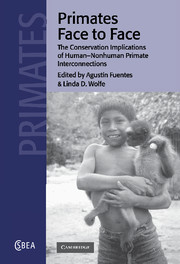Book contents
- Frontmatter
- Contents
- List of contributors
- Foreword
- Acknowledgements
- Introduction
- Part 1 Science and nonhuman primates
- Part 2 Cultural views of nonhuman primates
- Part 3 Conservation of nonhuman primates
- 9 Monkeys, humans and politics in the Mentawai Islands: no simple solutions in a complex world
- 10 Conservation must pursue human–nature biosynergy in the era of social chaos and bushmeat commerce
- 11 A cultural primatological study of Macaca fascicularis on Ngeaur Island, Republic of Palau
- 12 Monkeys in the backyard: encroaching wildlife and rural communities in Japan
- Part 4 Government actions, local economies and nonhuman primates
- Index
10 - Conservation must pursue human–nature biosynergy in the era of social chaos and bushmeat commerce
Published online by Cambridge University Press: 20 October 2009
- Frontmatter
- Contents
- List of contributors
- Foreword
- Acknowledgements
- Introduction
- Part 1 Science and nonhuman primates
- Part 2 Cultural views of nonhuman primates
- Part 3 Conservation of nonhuman primates
- 9 Monkeys, humans and politics in the Mentawai Islands: no simple solutions in a complex world
- 10 Conservation must pursue human–nature biosynergy in the era of social chaos and bushmeat commerce
- 11 A cultural primatological study of Macaca fascicularis on Ngeaur Island, Republic of Palau
- 12 Monkeys in the backyard: encroaching wildlife and rural communities in Japan
- Part 4 Government actions, local economies and nonhuman primates
- Index
Summary
Introduction
While social chaos spreads across equatorial Africa, human predation has become the most urgent threat to African primates. The explosion of commercial bushmeat hunting is destroying primate populations faster than their habitat can be cut down. The failure of conservation in great ape range countries is due primarily to human crises: poverty, illness, war, commercial greed, political corruption, lawlessness. There is a revolution going on in equatorial Africa, and it is being perpetrated by international exploiters who are radically manipulating the social order and cultural values of the African people so as to serve their personal and corporate pursuit of power and money. Because of this assault on African lifeways and values, social change and turmoil are the rule. In this milieu the practice of conservation must become proficient at understanding the context for change and working with its problems, causes, and solutions.
In this complex, harsh context, conservation's first challenge is to help African people to restore and sustain their cultures, their economies, and their reverence for nature as the foundation for ensuring the viability, diversity, and synergy of life in the region, and ultimately across the planet. The leaders of the conservation movement come from fields and disciplines that don't address the causes of Africa's social chaos.
- Type
- Chapter
- Information
- Primates Face to FaceThe Conservation Implications of Human-nonhuman Primate Interconnections, pp. 208 - 239Publisher: Cambridge University PressPrint publication year: 2002
- 7
- Cited by

